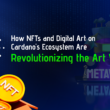The Cardano community and its vision for decentralized governance is truly an inspiration for everyone across the globe. It is by no surprise that community members are continuously going above and beyond by fostering amazing projects that will drive Cardano adoption and redefine its future. To promote Cardano and increase involvement around it, a team of three enthusiasts is looking to create a community-backed education portal that will help educate people about Cardano in a better and sustainable way. The proposed project aims to scale up a community of low-cost, energy-efficient stake pool operations by providing education and resources for Raspberry Pi stake pool operators hosted on their ADA.Pi portal.
Enhancing Stake Pool Operations
The Cardano community of Raspberry Pi stake pool operators rely on platforms like Telegram, Discord, and the official Cardano forum to share information, troubleshoot, and collaborate to keep their nodes running. The proposing team is looking to enhance this experience by creating a freely accessible documentation hub that serves as a single source of truth for information on demand. They plan to gather these build instructions, review them with the community and decide on the most popular ARM builds with the most community support before documenting the information.
The proposed community portal will host various links to suggested hardware, software packages, Github repositories, Stack Overflow answers, YouTube video tutorials on networking, IT infrastructure, security, power management, solar power, and virtually every other idea that community members may be seeking. This will help the Raspberry Pi community of stake pool operators around the world grow and flourish. The proposing team feels that by leveraging the low power and cost requirements of the Raspberry Pi along with a massive community of developers, they can influence a much larger demographic who would be willing to introduce Cardano nodes in remote areas of the world further enhancing the goal of Cardano decentralization.
Sharing Knowledge Across the Globe
The Raspberry Pi community is about teaching people the power of technology and open-source software by providing small, resource-efficient, affordable hardware to help them develop their skills. With such a low barrier to entry, the proposing team will help people with little to no technology background understand and run a mainnet stake pool on a very tight budget.
In their plans, the team will continually dedicate their resources to test RPi Cardano nodes, find bugs, fix them, and develop concrete documentation that will help new community members get started. As Cardano node requirements evolve, the team will help community members stay up to date with new hardware advancements and other requirements that come up.
To ensure this project is a success, the team will establish partnerships with other Cardano community stake pool operators, Catalyst projects, content creators, and developers. For long-term sustainability, the team plans to register as an educational 501c non-profit organization. This will enable them to apply for educational grants and accept donations from other partners.
The Team
The team behind this spectacular idea currently consists of three members, who hope to grow and onboard more contributors as the project gains traction. The team is made up of Cardano enthusiasts with experience in software development, stake pool operations, entrepreneurship, and education-focused work.
- Wael Ivie (Founder and team lead) – Wael is an entrepreneur who is widely focused on making the world a better place through decentralized blockchain technologies. He has a wealth of experience working on various engineering projects.
- Bryan Bookman(co-founder) – Bryan is an educational instructor currently working with Antelope Valley partners. With a background of creating educational resources, Bryan adds a lot of value to the team.
- Tony Burger (co-founder) – Tony is a systems analyst and software developer who has led multiple projects on warehouse distribution and fulfillment systems. His experience includes but not limited to ASP.NET MVC, Spring.NET, NHibernate, Javascript/J2EE, and IBM DB2 environment with RF devices.
In case you’d want to learn more about this project, have a look at the team’s GitHub at https://github.com/ADA-Pi. You can also contact them at [email protected] or [email protected].
A $13,943 Community-led Initiative
The project aims to make stake pool operations accessible to more people while doubling up as a low-cost education tool. To achieve this, the team has outlined three key deliverables for the first three months after funding. These are:
- Month 1 sprint – Deliver five GitBook/GitHub tutorials along with open source code.
- Month 2 sprint – Produce the first set of YouTube videos to complement and go along with our Gitbook tutorials.
- Month 3 sprint – Provide free 3D printing files for RPi cases and offer discount pricing on printed parts for SPOs.
To achieve this, the proposing team is requesting a total funding of $13,943. These funds will be used as follows:

Cardano, a Panacea for Development
The Cardano ecosystem continues to inspire widespread enthusiasm across the globe. Different industries are already eyeing Cardano to enable new business models, streamline existing processes, and potentially reshape their future. However, for the most part, these benefits are still more prospective than actual. To bring Cardano technology closer to the mainstream and ensure the real value is felt, we must address barriers hindering adoption. This project is set to contribute to this goal by providing better resources for developers and stake pool operators. Additionally, the initiative will improve collaboration and drive adoption by ensuring helpful resources are easily accessible by stakeholders across the Cardano community.
If you’d like to know more information or have questions/comments regarding this project proposal, check out the link. https://cardano.ideascale.com/a/dtd/ARMing-Cardano/340480-48088#











This is awesome imagine RPI solar tesla skynet cardano nodes planted in various remote locations. They would be self supporting
Thank You for the support
You can also check out our website https://ada-pi.io
Nice coverage. Armada is a great community.